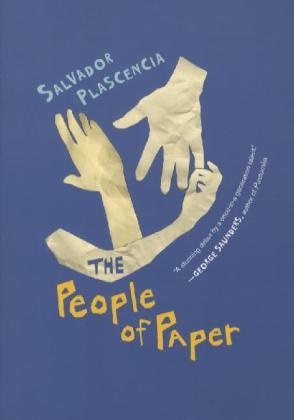Read more
Zusatztext PRAISE FOR THE PEOPLE OF PAPER "Salvador Plascencia's surrealistic metanovel, styled a la García Márquez, is a charming meditation on the relationship between reader, author, and story line, filled with mythic imagery . . . and unforgettable personalities . . . Readers will find it hard to turn away from The People of Paper . A. "-- Entertainment Weekly "A nervy new voice . . . Finally, beyond all the experimental devices, fairy-tale antics and fabulist inclination, Plascencia's novel is a story of lost love."-- San Francisco Chronicle Informationen zum Autor SALVADOR PLASCENCIA was born in Guadalajara, Mexico, and now lives in Los Angeles. He is a graduate of Whittier College and holds an MFA from Syracuse University. Klappentext The People of Paper is an astonishing debut novel about the anguish of lost love. Author Salvador Plascencia, a "once-in-a-generation talent" (George Saunders), weaves together the stories of a large cast of colorful characters, including: a disgruntled monk, a gang of carnation pickers, and a woman made of paper. "Wonderful and comically inventive." ?The New York Times Book Review Federico de la Fe is a devoted husband and father, but when his lime-loving wife, Merced, abandons him, he and his daughter, Little Merced (who also loves limes), must start a new life together. They leave their home in Mexico and head for California. There they settle among a community of flower pickers, where Federico de la Fe's sadness festers, and Little Merced develops a dangerous addiction to limes. All the while an oppressive force bears down on the town. When the identity of this mysterious oppressor is finally revealed, the story takes an unexpected turn and moves toward its magical, breathtaking end. Leseprobe CHAPTER ONE yyy SATURN Federico de la Fe discovered a cure for remorse. A remorse that started by the river of Las Tortugas. Every Tuesday Federico de la Fe and Merced carried their conjugal mattress past the citrus orchard and laid it down at the edge of the river. Federico de la Fe would take out his sickle and split open the mattress at the seams while Merced sucked on the limes she plucked from the orchard. Merced sent Federico de la Fe across the river to cut fresh straw and mint leaves while she pulled straw, wet with urine, from the open mattress. For the first five years of their marriage Merced felt no shame in having a husband who wet his bed. She got used to the smell of piss and mint in the morning. And she could not imagine making love without the fermenting stench of wet hay underneath her. When Little Merced was born, Merced joked about Federico de la Fe giving up his cotton under-briefs in exchange for cloth diapers like the ones their daughter wore. But instead both child and husband slept in the nude, curled around Merced. The ratio of mint leaves to hay was increased; and although Merced feared chafing, she spread white sand on the bed to absorb the moisture. But Merced grew impatient when Little Merced learned to use the chamber pot and Federico de la Fe’s penis continued to drip on the sheets. “This is the last straw I’m putting into this mattress,” she told Federico de la Fe at the river. “A wife can only take so many years of being pissed on.” Federico de la Fe went to the botanica to find a remedy, because he could not think of anything sadder than losing Merced. The curandero behind the counter gave him a green ointment to rub on his groin and two boiled turtle eggs to chew, a prescription designed to cure his enuresis. As Federico de la Fe chewed on the shells and meat of the eggs and spread the salve, he felt the weight of a distant force looking down on him. LITTLE MERCED The medication failed. My mother got up from the bed an...
Report
PRAISE FOR THE PEOPLE OF PAPER
"Salvador Plascencia's surrealistic metanovel, styled a la García Márquez, is a charming meditation on the relationship between reader, author, and story line, filled with mythic imagery . . . and unforgettable personalities . . . Readers will find it hard to turn away from The People of Paper. A."--Entertainment Weekly
"A nervy new voice . . . Finally, beyond all the experimental devices, fairy-tale antics and fabulist inclination, Plascencia's novel is a story of lost love."--San Francisco Chronicle

